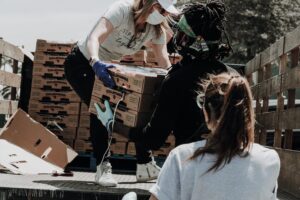We’re surrounded by problems. We have designed our day around the activities that we deem to be mandatory while minimizing the resistance we feel towards them. Everyday we are resisting that task we know needs to be done. Whether it’s taking out the garbage or folding laundry, there is something you know needs to be done and you are avoiding it.
But what if we stopped to think about those activities and decided what it was that we did not like about them. Is it possible to turn this activity into something we do enjoy?
This week we are challenging the kids in our Inventor’s Paradise Summer Camp to review their day and look for “problems” that they would like to avoid. Can you picture it? Waking up in the morning and looking around? What is the first thing you encounter that you don’t want to do? Brush your teeth? Make your bed? Then what? Maybe finishing your reading homework and having to tie your shoe laces.
These can be considered problems, irritations, time consuming or just something less than enjoyable. Either way, if you feel this way, chances are that others do as well and THAT’s an opportunity.
Next comes finding solutions. Developing solutions IS a skill and something that we are not born with. It is a muscle that we need to exercise or else we just become complainers and that person who calls the cops because the music from the Ice Cream Mans truck is disruptive.
We ask them to invent a solution to this problem that can be as elaborate as a robot that will make their bed and clean their room on command to a simple clip that will keep their shoes tied and stop them from coming undone. We love their uninhibited imagination and we are consistently inspired by the depth of ingenuity a 7-12 year old possesses. At that age, they don’t think in terms of limits, logistics and “reality”. They just think what would be cool and how it could work. It may sound silly and cute but when you look at someone like Elon Musk, he still holds this type of solution oriented thinking. A skill that NASA, Ford and Toyota lost a long time ago.
With their newfound belief that they can make a difference in their lives with a simple solution to an everyday problem, we ask our KidPreneurs to step outside of themselves to develop their observation skills to help others. They begin by looking at a day in the life of their parents or siblings. What is a task or chore they do not enjoy and can we use our new creative solution thinking to make the life of someone we love a little easier? We continue to challenge our kids a little more by asking about ways they can apply the same newfound skills to the world outside of their home. They have found ways to help community members such as inventing ways of identify everyday household items for the visually impaired, removing plastics from the ocean and even developing a community space for their city!
It’s fun for them and fun for us to explore the wacky and wild ideas they come up with, but more often then not they also come to a realization about half way through the week. There’s a moment when a student decides that an idea is also a possibility and with the right resources, it can become real! It’s at this point that even their language takes a turn from “we could do this…” to “I can do this…”
You see, in this camp, it isn’t just theory or talking about problems and make believe robots. They take immediate ACTION as well! For every solution they develop, they create a prototype invention to test, adjust and test again. It becomes real for them and the confidence they build when they can see that their ideas are valid and possible are priceless.
There’s magic in the smile of a child who’s just found a way to make a difference in someone’s day. It’s incredibly exciting for us to watch the discovery of their ability to impact others. We believe that kids are naturally curious and willing to try new ways to make the world around them a little better.
What seems to be the age when we decided to accept the “problems” around us and stop looking for creative solutions? Our Inventors Paradise Summer Camp has reinvigorated my curiosity and inspires me to see my day’s challenges as puzzles and problems as opportunities. Who doesn’t love solving a puzzle?


